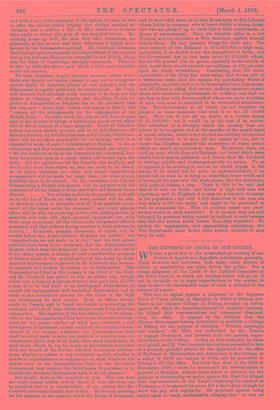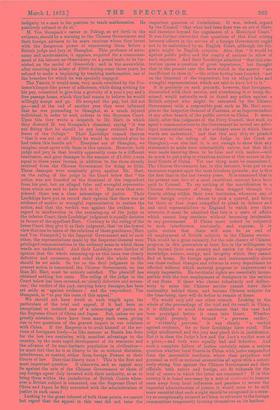THE EMPEROR OF CHINA IN OUR COURTS.
WE hear a good deal of the unsatisfactory working of our Courts of Appeal and Appellate jurisdiction generally. Their slowness and costliness, with many other defects of action or constitution, are often before the public. But a recent judgment of the Lords of the Judicial Committee of the Privy Council, to which our heading refers, will go far, if not to reconcile us to many imperfections in the system, at least to show the inestimable value of such a tribunal in the interest of justice.
This was an appeal against a judgment in the Supreme Court of China, sitting in Shanghai, in which a German pro- fessor in the Chinese College at Peking brought an action against Mr. Hart, the Inspector-General of Imperial Customs, for alleged false representations and consequent dismissal from his office. It appears by the evidence that the Chinese Government having determined to establish a College at Peking for the purpose of teaching "Western languages and sciences," Mr. Hart was authorised by the Yamea to engage Professors, and invested with the general super- intendence of the College. Acting on this authority, he came to England, and M. Von Gumpach having been presented to him as a properly qualified person, he was appointed to the office of Professor of Mathematics and Astronomy in the College, at a salary of £600 per annum in 1866, and he proceeded to Peking to fill that office. But from that date to the 29th of November, 1869,—when he announced his determination to proceed to Shanghai, without leave asked or granted, for the purpose of commencing an action against Mr. Hart for alleged false representations to the Yamen respecting his conduct as Professor,—it is asserted he never did a day's duty, though he drew the pay with regularity. He protested against being called upon to teach mathematics, alleging that "it was an indignity to a man in his position to teach mathematics. He positively refused to do so." M. Von Gumpach's career in Peking, as set forth in the evidence, should be a warning to the Chinese Government and their foreign advisers to be more cautious whom they invest with the dangerous power of summoning them before a British judge and jury at Shanghai. This professor of astro- nomy and mathematics, it appears, required for a commence- ment of his labours an Observatory on a grand scale, to be fur- nished on the model of Greenwich ; and in the meanwhile, after receiving his salary of £600 during some three years, he refused to make a beginning by teaching mathematics one of the branches for which he was specially engaged.
The Yemen, it would seem, very much exercised by the Pro- fessor's limpet-like power of adherence, while doing nothing for his pay, consented to give him a gratuity of a year's pay and a free passage home, which they had reason to believe he would willingly accept and go. He accepted the pay, but did not go,—and at the end of another year they were informed that he was proceeding to Shanghai, as a much injured individual, in order to seek redress in the Supreme Court. Upon this they wrote a despatch to Mr. Hart, in which they directed M. von Gumpach's dismissal, saying "it was not fitting that he should be any longer retained as Pro- fessor of the College." Their Lordships' remark thereon "that it was not at all likely he would be retained after he had taken this hostile act." Everyone out of Shanghai, we imagine, must agree with them in this opinion. However, both judge and jury in that locality apparently came to a different conclusion, and gave damages to the amount of £1,800, a sum equal to three years' income, in addition to the three already received from the Chinese Government for doing so little. These damages were nominally given against Mr. Hart, on the ruling of the judge in the Court below that "the action was not founded on the dismissal of the respondent from his post, but on alleged false and wrongful representa- tions which are said to have led to it." But even thus con- sidered, there was a clear miscarriage of justice. Their Lordships have put on record their opinion that there was no evidence of malice or wrongful representation to sustain the action, and that the verdict was against the evidence. In regard to misdirection in the summing-up of the judge in the inferior Court, their Lordships' judgment is equally decisive in favour of the appellant Hart. Contrary to the ruling of the lower Court, they give it as their judgment, that 'on the lowest view that can be taken of the relations of these gentlemen [Hart and Von Gumpach] to the Imperial Government and to each other, the representations made by the Inspector-General were privileged communications in the ordinary sense in which those words are understood.' And their Lordships were further of opinion that the whole summing-up on this issue was clearly defective and erroneous, and ruled that the whole verdict should be set aside. So far as the final judgment in the present action is concerned, the Chinese Government, no less than Mr. Hart, must be entirely satisfied. The plaintiff has obtained nothing but costs. The ruling of the judge in the Court below has been reversed, as 'clearly defective and errone- ous;' the verdict of the jury, carrying heavy damages, has been set aside as against evidence ;' and the respondent, Von Gumpach, is "to pay the costs of this appeal." We should not have dwelt at such length upon the particulars of the trial and appeal, if it had been an exceptional or isolated case of a miscarriage of justice in the Supreme Court of China and Japan. But, unless we are greatly mistaken, there have been many such cases, giving rise to two questions of the gravest import in our relations with China. If the Emperor is to avail himself of the ser- vices of foreigners freely—in like manner as Russia has done for the last two centuries, with manifest advantage to the country, by the more rapid development of its resources and the advance of its semi-barbaric population in civilisation— he must feel that he is at liberty to do so without dictation, interference, or control, either from foreign Powers or their Courts of law. Does that liberty exist ? This is the first and most important question. If otherwise, and an appeal may he against the acts of the Chinese Government or those of any foreign agent duly invested with their authority, so as to bring them within the jurisdiction of British Courts when- ever a British subject is concerned, can the Supreme Court of China and Japan be fitly entrusted with the administration of justice in such cases ?
Looking to the great interest of both these points, we cannot but regret that the appeal in this case did not raise the important question of Jurisdiction. It was, indeed, argued by the Council "that what had been done was an act of State, and therefore beyond the cognisance of a Municipal Court." It was further contended that questions of this kind arising between officers in the service of a foreign Government ought not to be maintained by an English Court, although the liti- gants might be English subjects. Also, that "it would be against public policy and the comity of nations to allow of such inquiries." And their Lordships admitted "that this con- tention opens a question of great importance," but thought that in the present case the facts stated in the answer "are insufficient to raise it,"—the action having been founded, "not on the dismissal of the respondent, but on alleged false and wrongful representations which are said to have led to it."
It is precisely on such grounds, however, that foreigners, dissatisfied with their service, and abandoning it or being dis- missed, would naturally seek to found any action against a British subject who might be entrusted by the Chinese Government with a responsible post such as Mr. Hart occu- pies as the Inspector-General of Customs, or as Superintendent of any other branch of the public service in China. It seems likely, after this judgment of the Privy Council, that such an agent's communications to the Government he served are privi- leged communications, "in the ordinary sense in which those words are understood," and that this may fitly be pleaded (contrary to the ruling of the Judge in the Court at Shanghai),—as also that it is not enough to show that any statements so made were substantially untrue, but that they were made knowing them to be false and with malice—will do much to put a stop to vexatious actions of this nature in the local Courts of China. Yet one thing must be remembered. The Chinese Government has, in this instance, been put to an enormous expense upon the most frivolous grounds ; nor is this the first time in the last twenty years. It is rumoured that in the present case fees of a most exorbitant amount have been paid to Counsel. To say nothing of the mortification to a Chinese Government of being thus dragged through the Courts sitting within their own territories, whenever any of their foreign employe's choose to pick a quarrel, and being for three or four years compelled to plead in defence and and send representatives to England to watch over their interests, it must be admitted that this is a state of affairs which cannot long continue without becoming intolerable to any government. If China must indeed be subjected to such interference, contumely, and expense, it is quite certain that there will soon be an end of all employment of British subjects in the Chinese service. This would be a great calamity, for the sole chance of Chinese progress, in this generation at least, lies in the willingness to look beyond their own country and nation for the superior knowledge, science, energy, and integrity which they cannot find at home. By foreign agents and instrumentality alone can those radical changes and reforms in every department be effected without which material progress or improvement is simply impossible. Ex-territorial rights are essentially incom- patible with the free employment of foreigners in the service of any State. If those who choose voluntarily and deliber- ately to enter the Chinese service cannot leave their nationality behind them, and become Chinese subjects for the time-being, they will do better to remain at home.
We would only add one other remark. Looking to the whole of the proceedings of the trial and its result in China, it is difficult to avoid the conclusion that the case had been prejudged before it came into Court. Whether it might properly be termed "a perverse verdict," or "evidently perverse," it was clearly " a verdict against evidence," for so their Lordships have ruled. The judge misdirected, and the jury may plead this in justification.
But it is clear the Judge's law and the Jury's verdict were of a piece,—and both were equally bad and defective. And such a complete failure of justice certainly raises a serious question whether local Courts in China, with juries empanelled from the mercantile residents, where class prejudices and personal as well as national animosities all agree with a notori- ously strong bias against the Chinese Government and their officials, both native and foreign, are fit tribunals for the trial of causes in which the latter are concerned ? If in this
country it is found necessary by a writ of certiorari to remove
cases away from local influences and passions to secure the impartial administration of justice, it would seem to be still more essential that such a right should be recognised in a coun- try so exceptionally situated as China, in reference to the foreign communities temporarily locating themselves on its borders.



































 Previous page
Previous page